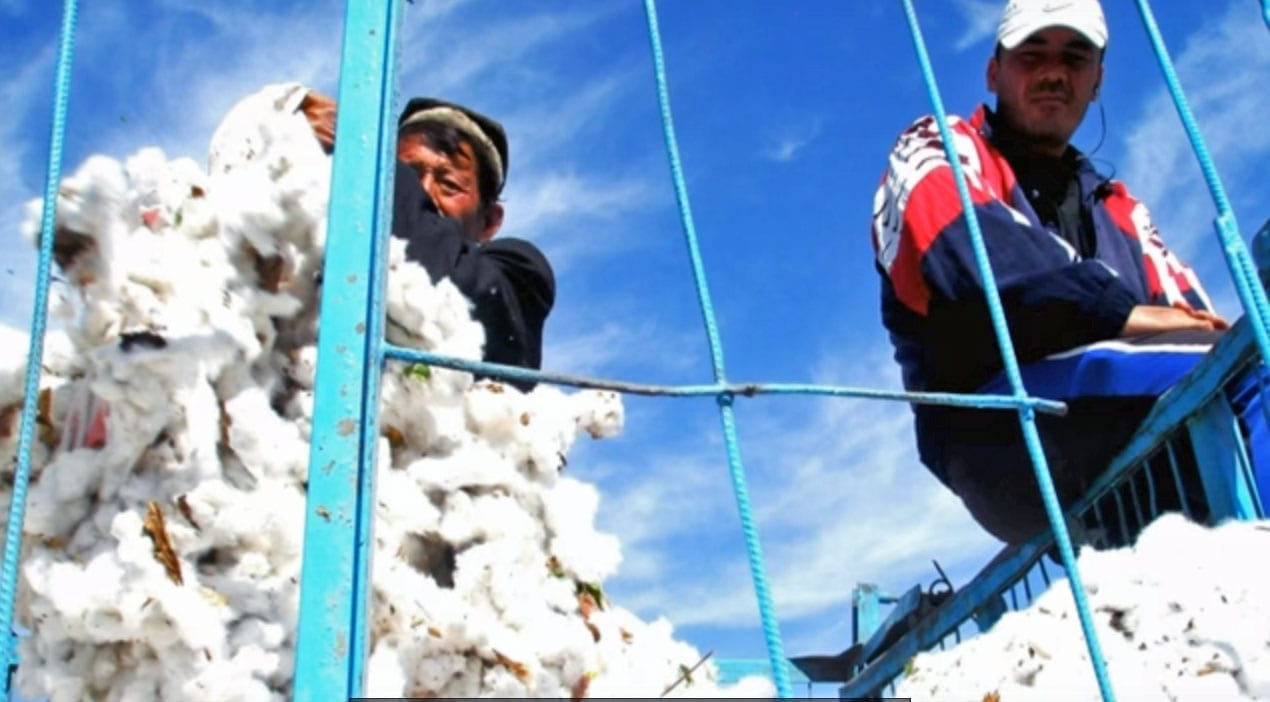
Jun 30, 2016
Uzbekistan and Turkmenistan, two countries where forced labor in cotton harvests is rampant, have been downgraded to the lowest ranking in the U.S. State Department’s 2016 Trafficking in Persons Report released this morning. The report also downgraded Myanmar (Burma) but boosted the ranking of Thailand, which a coalition of labor and human rights groups says has not meaningfully addressed human trafficking and should not have been upgraded.
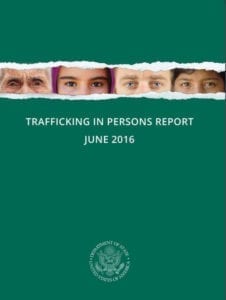 The report, which ranks countries based on their efforts to fight forced labor and human trafficking, downgraded Myanmar, Uzbekistan and Turkmenistan to the lowest level (Tier 3), meaning their governments do not comply with minimum U.S. Trafficking Victims and Protection Act (TVPA) standards and are not making significant efforts to become compliant.
The report, which ranks countries based on their efforts to fight forced labor and human trafficking, downgraded Myanmar, Uzbekistan and Turkmenistan to the lowest level (Tier 3), meaning their governments do not comply with minimum U.S. Trafficking Victims and Protection Act (TVPA) standards and are not making significant efforts to become compliant.
Each year, the Uzbek government forces more than 1 million teachers, nurses and others to pick cotton for weeks during last fall’s harvest. Last year, the government went to extreme measures—including jailing and physically abusing researchers independently monitoring the process—to cover up its actions.
In 2015, the State Department boosted Uzbekistan from Tier 3 to the “Tier 2 Watchlist,” saying the country was making efforts to become compliant with the TVPA, a move rejected by human rights activists who each year risk their lives to document widespread forced labor during cotton harvests.
Thailand Should Not Be Upgraded
Moving Thailand from the report’s lowest ranking is not warranted, according to a 13-member coalition, the Alliance to End Slavery and Trafficking (ATEST), which includes the Solidarity Center.
“Thailand’s lack of policy implementation and meaningful change on the ground calls for the lowest Tier 3 ranking,” says Kristen Abrams, ATEST acting director.
In June 2014, the State Department downgraded Thailand to the lowest ranking, due to reports of migrant workers, primarily from Burma and Cambodia, working in slave-like conditions on Thai fishing boats, fueling the country’s $7.3 billion seafood export industry and making it the world’s third-largest exporter. Today, many migrant workers still toil in forced labor and are held against their will on the boats where they are beaten and even killed. Thailand’s estimated 3 million migrants make up 10 percent of its workforce, but in seafood processing the make up 90 percent.
In releasing the report, U.S. Secretary of State John Kerry highlighted the plight of domestic workers, many of whom are working in countries far from their homes and are especially vulnerable to exploitation and abuse. Kerry announced the creation of a model contract for domestic workers based on international standards and a memorandum of understanding for origin and destination countries that sets clear standards designed to prevent the abuses of domestic work.
‘Malaysia Has Done Little to Address Trafficking’
This year’s report also fails to fix last year’s controversial upgrade of Malaysia, according to the coalition.
“More than a year after the discovery of mass graves of trafficking victims along the Malaysia-Thailand border, there is little evidence that Malaysia has taken anything more than meager steps to address its troublesome human trafficking situation,” Abrams says.
Among the 27 countries on Tier 3, the lowest ranking, are Algeria, Burundi, Haiti, Russia, Venezuela and Zimbabwe.
Profits from forced labor account for $150 billion per year, according to the International Labor Organization (ILO).
The report organizes countries into tiers based on trafficking records: Tier 1 for nations that meet minimum U.S. standards; Tier 2 for those making significant efforts to meet those standards; Tier 2 “Watch List” for those that deserve special scrutiny; and Tier 3 for countries that are not making significant efforts.
The Trafficking in Persons report, which has been issued annually for 16 years, covers 188 countries and is required by the 2000 TVPA law.
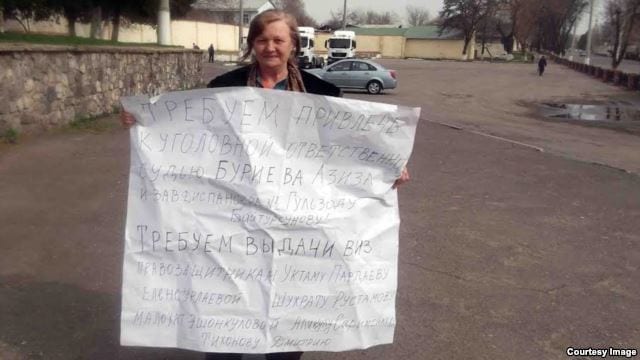
Jun 6, 2016
Uzbek human rights defender Elena Urlaeva was released last week from a psychiatric hospital in Tashkent where she was detained against her will for more than a month, according to the Cotton Campaign, a coalition of worker rights and human rights groups that includes the Solidarity Center.
While expressing relief at Urlaeva’s release, Umida Niyazova, director of the Uzbek-German Human Rights Forum says, “We continue to be alarmed at the heightened repression campaign the Uzbek government is carrying out against those who monitor forced labor in the cotton harvest.”
For 16 years, Urlaeva has documented forced labor in Uzbekistan’s cotton fields, where some 1 million teachers, medical professionals and others are forced to toil during harvest seasons. She has been credited with helping significantly reduce child labor in cotton fields, and this year was among human rights defenders in Uzbekistan to receive the International Labor Rights Forum 2016 Labor Rights Defenders Award.
Urlaeva was arrested five times last year as she spoke with those forced by the government to labor in the country’s cotton fields, and says that she was physically assaulted during the subsequent interrogation.
Uzbek Government Crackdown on Human Rights Activists
The International Labor Organization (ILO) has pushed the Uzbek government to end forced labor. Following a complaint by Uzbek civil society, the World Bank attached covenants stipulating its loans to Uzbekistan could be stopped and subject to repayment if forced or child labor was detected in project areas by ILO monitors contracted by the World Bank to carry out labor monitoring during the harvest. In March, members of the Cotton Campaign urged the World Bank to make good on its promise.
The Uzbek government has responded to global pressure to end forced labor by cracking down on Uzbek labor rights activists who monitor cotton harvests.
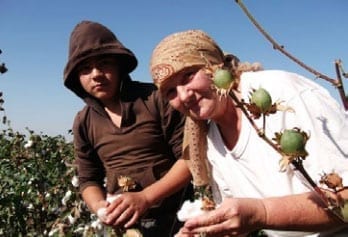
May 20, 2016
Uzbek human rights defender Elena Urlaeva has been detained against her will in a psychiatric hospital in Tashkent and the government should release her immediately, the Cotton Campaign said today. The Cotton Campaign is a coalition of worker rights and human rights groups that includes the Solidarity Center.
“Holding Elena Urlaeva in a psychiatric hospital without a clear medical rationale is a grave breach of medical ethics,” says Umida Niyazova, director of the Uzbek-German Forum for Human Rights (UGF). “She should be released immediately, and the Uzbek government must cease using hospitals as extrajudicial detention centers.”
Urlaeva’s Efforts Key to Reducing Child Labor
Urlaeva for years has documented forced labor in Uzbekistan’s cotton fields, where some 1 million teachers, medical professionals and others are forced to toil during harvest seasons. She has been credited with helping significantly reduce child labor in cotton fields, and this month was among human rights defenders in Uzbekistan to receive the International Labor Rights Forum 2016 Labor Rights Defenders Award.
Urlaeva was detained last year after interviewing and photographing teachers forced by government officials to work in the cotton fields, and says that she was physically assaulted during the subsequent interrogation.
The International Labor Organization (ILO) has pushed the Uzbek government to end forced labor. Following a complaint by Uzbek civil society, the World Bank attached covenants stipulating its loans to Uzbekistan could be stopped and subject to repayment if forced or child labor was detected in project areas by ILO monitors contracted by the World Bank to carry out labor monitoring during the harvest. In March, members of the Cotton Campaign urged the World Bank to make good on its promise.
Uzbek Government Targets Human Rights Defenders
The Uzbek government has responded to global pressure to end forced labor by cracking down on Uzbek labor rights activists who monitor cotton harvests.
Uktam Pardaev, another Uzbek labor rights activist was jailed while he was monitoring last fall’s cotton harvest in Uzbekistan and now is serving three years’ probation at his home, where he is under constant surveillance by security services. (You can take action to help Pardaev.)
Also last fall, Uzbek human rights defender Dimitry Tikhonov reported that his home office was burned and all the equipment and documentation he collected on Uzbekistan’s use of forced labor in the country’s cotton harvestsm destroyed. No other room in his home was touched by the fire, he said. Tikhonov also was arrested and beaten by police as he took photos of some 20 busloads of teachers and school employees forced into the cotton fields for the annual harvest. Tikhonov has since fled the country.
The stories of all three Uzbek human rights defenders are featured in a video created as part of the Labor Rights Defenders Award ceremony, in which a voice-over points out that “the Uzbek government treats them as enemies of the state because of their peaceful human rights activities.”
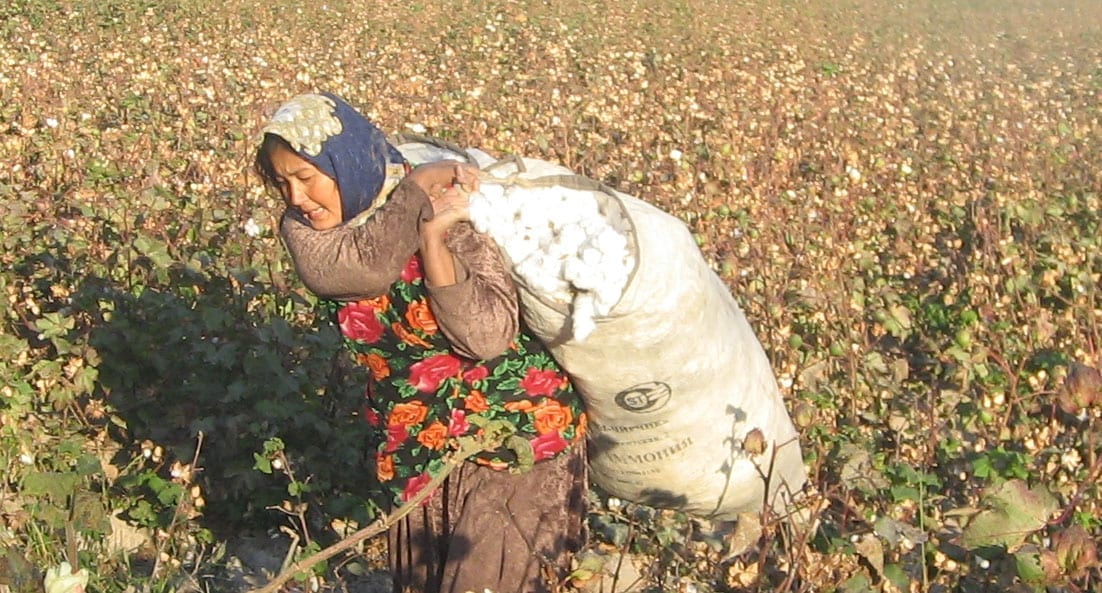
May 3, 2016
A global union campaign is calling on the Uzbek government to reverse its conviction of Uzbek human rights activist Uktam Pardaev, who was sentenced to three years’ probation in January and is under constant surveillance by security services at his home. Officials also continue to harass Uktam Pardaev’s relatives and friends, who have been watched, questioned and threatened, according to global union and human rights groups.
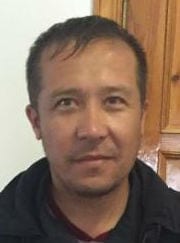
Human rights activist Uktam Pardaev was jailed while he was monitoring last fall’s cotton harvest in Uzbekistan. Credit: IUF
ardaev, a member of an independent cotton harvest monitoring group, was arrested in November 2015 on trumped-up charges of fraud and taking a bribe. He was held for eight weeks in pre-trial detention, where he was locked in a damp, cold cell with only a dirty mat to sleep on and little food. Pardaev says he witnessed officials torturing and mistreating detainees to coerce confessions and was beaten severely on one occasion.
Pardaev was among human rights activists monitoring last fall’s cotton harvest in Uzbekistan, where more than 1 million teachers, nurses and others are forced to pick cotton for weeks each harvest season. A report released in March documented how the government took extreme measures to cover up its actions last fall, jailing and physically abused those independently monitoring the process.
“The government unleashed an unprecedented campaign of harassment and persecution against independent monitors to attempt to cover up its use of forced labor while taking pains to make widespread, massive forced mobilization appear voluntary,” according to The Cover-Up: Whitewashing Uzbekistan’s White Gold.
Uzbekistan, which gets an estimated $1 billion per year in revenue from cotton sales, faced high penalties for not addressing its ongoing forced labor. But rather than end the practice, the government sought to cover it up, according to the report, produced by the Uzbek-German Forum for Human Rights.
Take action now and send a message of support calling on the Uzbek government to reverse Pardaev’s conviction; conduct a prompt, independent, and impartial investigation into his credible allegations of ill-treatment by prison officials; and bring those responsible
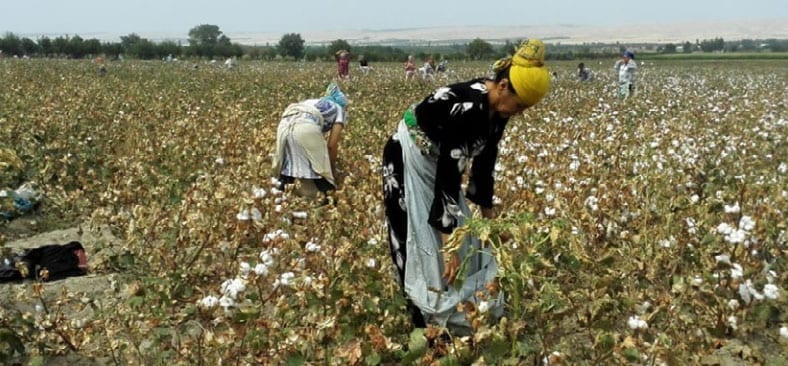
Mar 16, 2016
The Uzbekistan government again forced more than 1 million teachers, nurses and others to pick cotton for weeks during last fall’s harvest. But this time, the government went to extreme measures—including jailing and physically abusing those independently monitoring the process—to cover up its actions, according to a new report.
“The government unleashed an unprecedented campaign of harassment and persecution against independent monitors to attempt to cover up its use of forced labor while taking pains to make widespread, massive forced mobilization appear voluntary,” according to The Cover-Up: Whitewashing Uzbekistan’s White Gold.
Further, Uzbek officials in some cases forced teachers, students and medical workers to sign statements attesting that they picked cotton of their own will and agreeing to disciplinary measures, including being fired or expelled, if they failed to pick cotton. It instructed people to lie to monitors saying they came to pick cotton of their own volition.
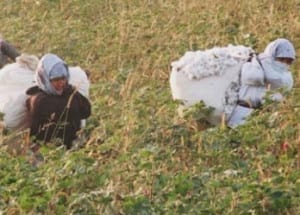
Roughly 1 million teachers, nurses and other workers are forced each year to toil in Uzbekistan’s cotton fields. Credit: Uzbek-German Foundation
Covering Up for Cash
Uzbekistan, which gets an estimated $1 billion per year in revenue from cotton sales, faced high penalties for not addressing its ongoing forced labor. But rather than end the practice, the government sought to cover it up, according to the report, produced by the Uzbek-German Forum for Human Rights.
The World Bank has invested more than $500 million in Uzbekistan’s agricultural sector. Following a complaint from Uzbek civil society, the bank attached loan covenants stipulating that the loans could be stopped and subject to repayment if forced or child labor was detected in project areas by monitors from the International Labor Organization (ILO), contracted by the World Bank to carry out labor monitoring during the harvest.
Last week, the Cotton Campaign, a coalition of labor and human rights groups that includes the Solidarity Center, presented a petition signed by more than 140,000 people from around the world to World Bank President Dr. Jim Yong Kim, calling on the bank to suspend lending to the agriculture sector in Uzbekistan until the Uzbek government changes its policy of forced labor in the cotton industry.
Farmers and business owners also were coerced by the government, the report found. Farmers are forced to plant state-ordered acreage of cotton and wheat or face the loss of their land. In 2015 the government relied on law enforcement to monitor and control the agricultural process and instill fear in farmers. Police regularly patrolled cotton fields, inspected farms and monitored workers and the harvest progress.
Officials and business owners, under pressure to support the national cotton harvest plan, ordered 40 percent or more of their employees to pick cotton, often in written directives.
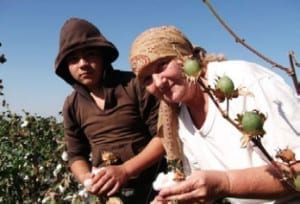
Elena Urlaeva (right), was arrested at least four times and physically abused in prison for her work monitoring forced labor practices in Uzbekistan. Credit: Uzbek-German Forum
Physically Abused in Prison
Among independent monitors harassed by the Uzbek government, long-time human rights and civic activist, Elena Urlaeva, was arrested at least four times during the 2015 cotton harvest as well as twice during the spring planting and weeding season.
The head of the Tashkent-based Human Rights Alliance of Uzbekistan, Urlaeva reported that she was injected with sedatives, stripped searched and forced to go without sanitation facilities during one incarceration last year. Another time, Urlaeva, her husband, their 11-year-old son and a family friend and farmer who had invited them to stay on his land were arrested because Urlaeva “photographed the fields without permission.”
For years, the Uzbekistan government has forced health care workers, teachers and others to pick cotton for 15 to 40 days, working long hours and enduring abysmal living conditions, including overcrowding and insufficient access to safe drinking water and hygiene facilities.

 The report, which ranks countries based on their efforts to fight forced labor and human trafficking, downgraded Myanmar, Uzbekistan and Turkmenistan to the lowest level (Tier 3), meaning their governments do not comply with minimum U.S. Trafficking Victims and Protection Act (TVPA) standards and are not making significant efforts to become compliant.
The report, which ranks countries based on their efforts to fight forced labor and human trafficking, downgraded Myanmar, Uzbekistan and Turkmenistan to the lowest level (Tier 3), meaning their governments do not comply with minimum U.S. Trafficking Victims and Protection Act (TVPA) standards and are not making significant efforts to become compliant. 






